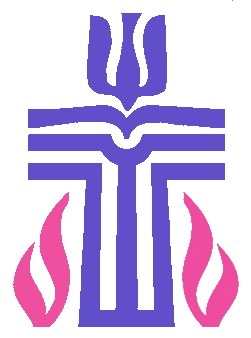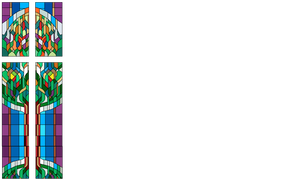 Presbyterian Church (USA) Logo
Presbyterian Church (USA) Logo
Presbyterians are one kind of Christian. The word comes from the Greek word presbuteros, which means "elder." Our name reflects the Old and New Testament practices of choosing leaders from among the wisest people in the community. The Presbyterian denomination began with the Protestant Reformation. Martin Luther sought to reform the Roman Catholic Church in Germany beginning in 1517. The Protestants protested against the abuses of the Roman Catholic Church and for scripture being the basis of what the church does.
Presbyterians celebrate two sacraments: baptism and the Lord's Supper (Communion). In baptism a person is initiated into the Christian (not the Presbyterian) Church and makes a public confession of faith. We baptize infants in our church and give them a chance to make their own confession of faith at confirmation. Baptism is necessary for membership in the Presbyterian Church, but it may be performed in any Christian church. Presbyterians do not believe that baptism guarantees a person eternal life, nor do we believe that those that are not baptized are denied eternal life.
The Lord's Supper in the Presbyterian Church is open to every baptized Christian. In the Lord's Supper (or "Communion" or "Eucharist") the bread and wine represent Christ's body and blood and remind us of Christ's sacrifice on the cross. Presbyterians understand that they are eating bread and drinking grape juice. (We use grape juice rather than wine because there are recovering alcoholics in our congregation.)
Presbyterian congregations are guided by the Session. The elders are elected by the congregation to serve three-year terms on the Session. Pastors also are members of the Session. The Board of Deacons takes care of befriending the lonely and visits the shut-ins of our congregation.
57 churches in make up the Presbytery of Des Moines. The Presbytery oversees the preparation of candidates for the ministry, among other tasks. Fifteen Presbyteries in six states comprise the Synod of Lakes and Prairies. The synod oversees the work of the presbyteries. All Synods are overseen by the General Assembly, our national church government. GA oversees international mission work and the preparation of Christian education curricula.
If you would like to learn more about the Presbyterian Church (USA), check out the Our Mission & Philosophy or A Brief History of St Paul, or the Presbyterian 101 Page.
Presbyterians celebrate two sacraments: baptism and the Lord's Supper (Communion). In baptism a person is initiated into the Christian (not the Presbyterian) Church and makes a public confession of faith. We baptize infants in our church and give them a chance to make their own confession of faith at confirmation. Baptism is necessary for membership in the Presbyterian Church, but it may be performed in any Christian church. Presbyterians do not believe that baptism guarantees a person eternal life, nor do we believe that those that are not baptized are denied eternal life.
The Lord's Supper in the Presbyterian Church is open to every baptized Christian. In the Lord's Supper (or "Communion" or "Eucharist") the bread and wine represent Christ's body and blood and remind us of Christ's sacrifice on the cross. Presbyterians understand that they are eating bread and drinking grape juice. (We use grape juice rather than wine because there are recovering alcoholics in our congregation.)
Presbyterian congregations are guided by the Session. The elders are elected by the congregation to serve three-year terms on the Session. Pastors also are members of the Session. The Board of Deacons takes care of befriending the lonely and visits the shut-ins of our congregation.
57 churches in make up the Presbytery of Des Moines. The Presbytery oversees the preparation of candidates for the ministry, among other tasks. Fifteen Presbyteries in six states comprise the Synod of Lakes and Prairies. The synod oversees the work of the presbyteries. All Synods are overseen by the General Assembly, our national church government. GA oversees international mission work and the preparation of Christian education curricula.
If you would like to learn more about the Presbyterian Church (USA), check out the Our Mission & Philosophy or A Brief History of St Paul, or the Presbyterian 101 Page.
